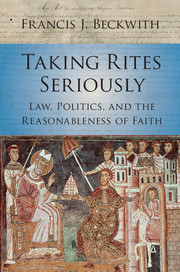Book contents
- Frontmatter
- Dedication
- Contents
- Acknowledgments
- 1 Introduction: Faith Seeking Understanding
- Part I Reason and Motive
- Part II Dignity and Personhood
- Part III Nature and Sex
- 6 How to Be an Anti–Intelligent Design Advocate: Science, Religion, and the Problem of Intelligent Design
- 7 Same-Sex Marriage and Justificatory Liberalism: Religious Liberty, Comprehensive Doctrines, and Public Life
- 8 Conclusion: Taking Rites Seriously
- Index
6 - How to Be an Anti–Intelligent Design Advocate: Science, Religion, and the Problem of Intelligent Design
from Part III - Nature and Sex
Published online by Cambridge University Press: 05 November 2015
- Frontmatter
- Dedication
- Contents
- Acknowledgments
- 1 Introduction: Faith Seeking Understanding
- Part I Reason and Motive
- Part II Dignity and Personhood
- Part III Nature and Sex
- 6 How to Be an Anti–Intelligent Design Advocate: Science, Religion, and the Problem of Intelligent Design
- 7 Same-Sex Marriage and Justificatory Liberalism: Religious Liberty, Comprehensive Doctrines, and Public Life
- 8 Conclusion: Taking Rites Seriously
- Index
Summary
For when anyone in the endeavor to prove the faith brings forward reasons which are not cogent, he falls under the ridicule of the unbelievers: since they suppose that we stand upon such reasons, and that we believe on such grounds.
St. Thomas Aquinas (1225–1274)Here I would say what I heard from an ecclesiastical person in a very prominent position (Cardinal Baronio), namely that the intention of the Holy Spirit [in Scripture] is to teach us how one goes to heaven and not how heaven goes.
Galileo Galilei (1564–1642)The debate in the United States over whether the teaching of Intelligent Design (ID) in public school science classes should be required, permitted, or prohibited has become a cantankerous affair. Like the issues we covered in Chapters 4 and 5, disputants fall along religious lines, with the more religiously conservative citizens generally advocating the teaching of ID in public school science classes, while secular and religiously liberal citizens generally arguing that ID is a religious position and thus teaching it in public school science classes would violate the Establishment Clause of the U.S. Constitution. Although as a matter of law I disagree with the latter's constitutional judgment, I argue in this chapter that there are good reasons for religiously conservative citizens not to advance the cause of ID, and there are good reasons for secular and religiously liberal citizens not to equate the case for ID with the rational plausibility of theism (or even the case for design in nature). This chapter addresses both groups, and is critical of each.
In order to show how both sides of the ID dispute fail to “take rites seriously,” I am going to address a question that, as far as I can tell, has been unanimously ignored in this debate, but should be of interest to anyone who may have a peculiar curiosity as to what “really” lurks behind, and may unconsciously form, the beliefs of those engaged in this cultural combat. That question is: what must one believe to be an anti–Intelligent Design advocate?
In order to answer this question, I consult several scholars (including ID critics) as well as Judge John E. Jones III's opinion in Kitzmiller v. Dover, the well-known 2005 federal district court case that struck down a pro-ID school board policy.
- Type
- Chapter
- Information
- Taking Rites SeriouslyLaw, Politics, and the Reasonableness of Faith, pp. 139 - 171Publisher: Cambridge University PressPrint publication year: 2015



